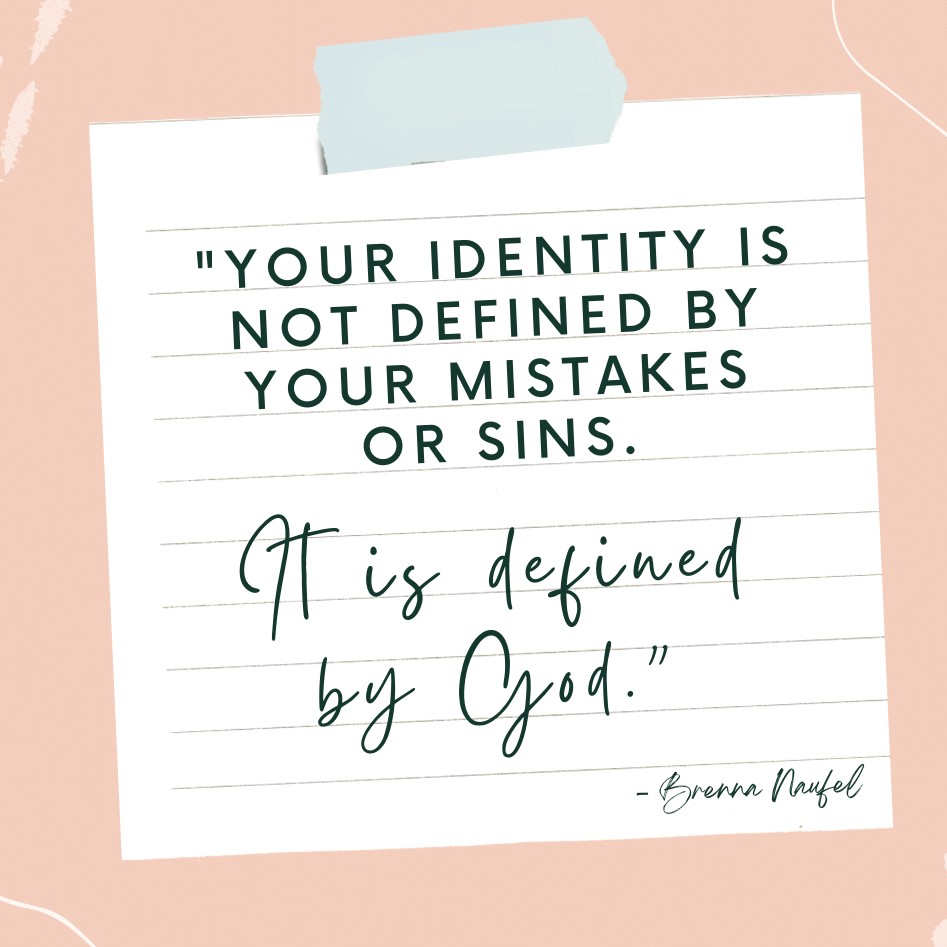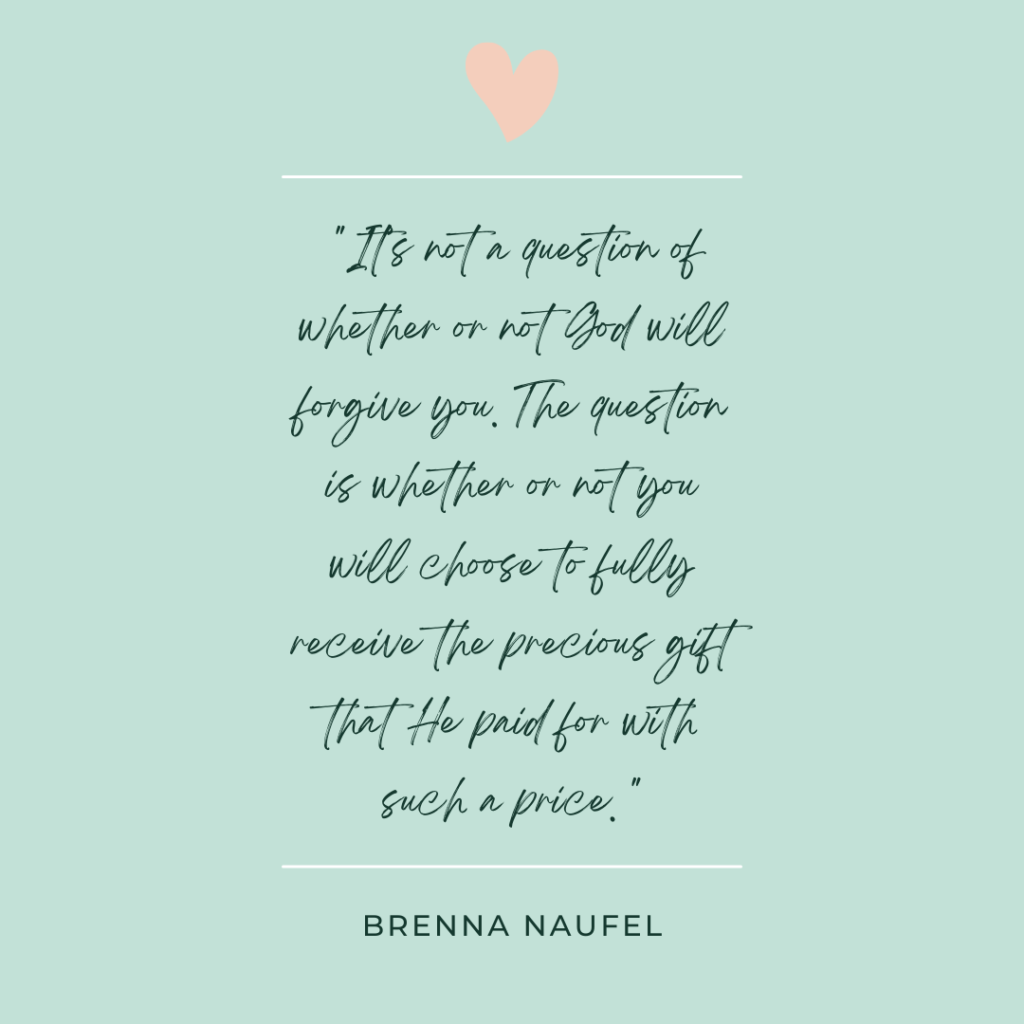So, you’ve blown it. Big time. There are simply no words to describe the damage your choices and actions have caused. And now you are asking questions about forgiving yourself:
- Why can’t I forgive myself for my past mistakes?
- How can I forgive myself for my sins?
- How can I forgive myself for cheating?
- How can I forgive myself for doing something terrible?
I’ve been there and done that, friend. I cheated on my husband for five years with a man that I worked with. And part of why I remained entangled in that sin for so long was because of the lies and accusations hurled at me that I bought into – that God would never forgive me, that my husband, Garrett, would never forgive me and that, ultimately, this is just who I was and how it was going to be.
Did I learn to forgive myself for my affair? Yes, I did but, not because I am awesome possum sauce. I was able to forgive myself because of God’s complete forgiveness of me. It is through the forgiveness of Jesus Christ that I can extend forgiveness to myself and to others.
“Therefore, I tell you, her many sins have been forgiven—as her great love has shown. But whoever has been forgiven little loves little.” Luke 7:47
Accepting God’s forgiveness and, ultimately, being able to forgive yourself, are built upon the foundation of recognizing your desperate need for Christ and accepting Jesus’ death and resurrection as the payment for your sin. You cannot pay the penalty of sin on your own (“…for the wages of sin is death”, Romans 6:23).
So, with that in mind, let’s first ask the question, “Have you accepted Jesus Christ as your personal Savior?” If you are like, “What the deuce does that mean?”, then, please check out this post first. 🙂
So, with the foundation that Jesus Christ is my Lord and Savior, let’s dive into what forgiving yourself looks like.
Confess your sins
Believe me, I know confession is scary (check out my post, “Should I confess my affair to my spouse?“) We don’t fully know what the earthly outcome will be from the consequences of our sin. The future is super unclear and blurry. Yet, without true confession, there cannot be healing.
“Therefore confess your sins to each other and pray for each other so that you may be healed.” James 5:16
What do I mean by true confession?
Several things:
- The confession must be humble, sincere, thorough, and complete.
- You must take full responsibility for the sin and not blame anyone else or circumstance.
- Confess your sins to God AND tell the person or people that are most directly impacted by your sin.
For example, a couple of months before I confessed my affair to my husband, he confessed to me that he had been struggling with pornography for the past eight years. Here’s the kicker. He had confessed that struggle to other men in his life. It wasn’t completely hidden.
Yet, I was the person that was most impacted by his sin. And it wasn’t until he confessed to me that he was able to put that sin completely to death. Even with confessing it to other people, it remained in the dark and secured a foothold in his life because he didn’t confess it to me.
So, even if I had told anyone else about my affair, this step of confession would not have been complete until I confessed the affair to my husband. And, when I did, I was utterly broken and humble. I did not blame anyone or anything else for my actions. I took full ownership and responsibility.
Now, please note, confession for me was a long, ongoing process. While I didn’t minimize what I had done with my initial confession, there still was five years’ worth of details to confess. You will have to be patient and long-suffering in this regard to work towards any kind of reconciliation with the ones you so deeply wounded.
Repentance
Repentance goes hand-in-hand with confession. It would be incredibly difficult for a confession to be thorough, humble, and sincere without repentance.
What does repentance mean? It means “turning away; a sincere regret or remorse”. Or, in other words, “repentance – meaning a deep change of heart that hates the sin and turns toward utter faithfulness.” Pastor John Piper, Desiring God “How can couples heal after adultery Podcast
“Repent, then, and turn to God, so that your sins may be wiped out, that times of refreshing may come from the Lord…” Acts 3:19 NIV
The Bible is filled with God’s plea for us to turn away from sin and to run towards Him. God paid an unimaginable cost for our freedom from sin. Will we still sin? Absolutely! But, we can be free from the slavery of sin. I am no longer a slave to the sin of an affair. My husband is no longer a slave to the sin of engaging with pornography.
“What shall we say, then? Shall we go on sinning so that grace may increase? By no means! We are those who have died to sin; how can we live in it any longer?… For we know that our old self was crucified with him so that the body ruled by sin might be done away with, that we should no longer be slaves to sin— because anyone who has died has been set free from sin.”
Romans 6:1-2, 6-7
Guilt & Sorrow
Feeling guilt, sorrow, and remorse over your sin is a godly and appropriate response. I would argue that if you have not felt these things, then perhaps you have not felt the full weight of your sin or begun to scratch the surface of how abhorrent sin is to God and how desperately you need Jesus. God uses guilt and sorrow over our sin to move us closer to Him and to be reconciled to Him.
Just like many people (including myself) never intended to have a full-blown affair, David, the “man after God’s own heart”, also stepped onto a slippery slope and made one sinful decision after another. Here is a quick recap from 1 Samuel chapter 11:
- David stays home when other kings are off to war
- He’s up late one night and sees a beautiful woman (Bathsheba) bathing on a rooftop
- Instead of turning his gaze away and fleeing from temptation, he lusts after her and sends messengers to find out more about her
- He learns that she is married to Uriah, a faithful soldier in David’s army
- He STILL sends messengers to bring Bathsheba to him and he sleeps with her
- She becomes pregnant. So, David brings Uriah back from battle in hopes that he will sleep with his wife to cover up his indiscretion
- When Uriah refuses to sleep with his wife, David arranges to have him “killed in battle”.
Wow! From all that we can tell, David never set out that sleepless night planning to take another man’s wife, get her pregnant, and then murder her husband because of his sinful behavior. Yet, that’s exactly what happened.
Notice we don’t really see any remorse or guilt on David’s part until he is rebuked by the prophet Nathan in chapter 12. We know this took at the very least nine months because Bathsheba has given birth to their son.
Then David said to Nathan, “I have sinned against the Lord.” Nathan replied, “The Lord has taken away your sin. You are not going to die. But because by doing this you have shown utter contempt for the Lord, the son born to you will die.” 2 Samuel 12:13-14
David finally comes face to face with his abhorrent sin, and it will cost him (and Bathsheba) their son’s life. Can you imagine the pain, the guilt, the remorse? The utter desperation before the Lord? For a week he fasts and pleads with the Lord to spare his son. Yet, on the seventh day, his son dies.
David is a beautiful example of fully feeling guilt and sorrow over his sinful actions AND then moving into the grace, mercy and forgiveness of God, His King. Out of his broken spirit he fully recognizes his sin before the Lord and boldly asks for mercy and reconciliation. We can see this in David’s writing in Psalm 51.
Psalm 51
Have mercy on me, O God, according to your unfailing love; according to your great compassion blot out my transgressions. Wash away all my iniquity and cleanse me from my sin. For I know my transgressions, and my sin is always before me.
Against you, you only, have I sinned and done what is evil in your sight;
so you are right in your verdict and justified when you judge.Surely I was sinful at birth, sinful from the time my mother conceived me.
Yet you desired faithfulness even in the womb; you taught me wisdom in that secret place.Cleanse me with hyssop, and I will be clean; wash me, and I will be whiter than snow.
Let me hear joy and gladness; let the bones you have crushed rejoice.
Hide your face from my sins and blot out all my iniquity.Create in me a pure heart, O God, and renew a steadfast spirit within me.
Do not cast me from your presence or take your Holy Spirit from me.
Restore to me the joy of your salvation and grant me a willing spirit, to sustain me.Then I will teach transgressors your ways, so that sinners will turn back to you.
Deliver me from the guilt of bloodshed, O God, you who are God my Savior, and my tongue will sing of your righteousness. Open my lips, Lord, and my mouth will declare your praise.You do not delight in sacrifice, or I would bring it; you do not take pleasure in burnt offerings.
Psalm 51:1-17
My sacrifice, O God, is a broken spirit; a broken and contrite heart you, God, will not despise.
Do you see? Feeling guilt and remorse over your sin is the pathway to confession, repentance, and ultimately, reconciliation with your Savior.
Claiming God’s Truth
Do you believe who God says He is and what He has done for you?
A critical step in being able to forgive yourself is to first wholly accept God’s forgiveness of you. And He goes beyond forgiveness – He washes us clean, He removes our sins from us as far as the east is from the west, and He remembers our sins no more.
“…he does not treat us as our sins deserve or repay us according to our iniquities. For as high as the heavens are above the earth, so great is his love for those who fear him; as far as the east is from the west, so far has he removed our transgressions from us.”
Psalm 103:10-12 NIV
Stepping into Grace & Forgiveness
Please hear this: Your identity is not defined by your mistakes or sins. Your identity is defined by God.
What matters most is who God says you are. Because of having Jesus in your heart, God looks upon you as holy and dearly loved. Without spot or blemish. He exclaims His love for you and His delight in you!
You MUST accept His truth in your heart! Will you believe and live in the reality that God forgives you?

Once I accepted God’s forgiveness for me, here are the questions I wrestled with:
If the God of the Universe, the Holy, and Perfect One, freely forgives me and covers me with His grace, who am I to not extend forgiveness and grace to myself? Am I above God? Are my standards and idea of perfection greater than His?
We so often hold out on forgiving ourselves. We continue to punish ourselves as if that is the “holy” thing to do. We still must live with the earthly consequences of our sin, but we do not have to live perpetually in guilt and shame. As a good Father, how it must break His heart when we, His children, attempt to hold onto the guilt of the sin that He paid so much to remove from us.
Forgiving yourself does not excuse or justify your sinful behavior. It allows you to live in the truth of who God declares you are: holy, blameless, and loved. It allows you to break free from Satan’s foothold and step into the life of joy and freedom God created you for.

Forgiveness is a Gift
Even though God calls us to forgive much because we have been forgiven much, we cannot force someone else to forgive us when we have wronged them. It truly is a gift to be freely given, completely in the hands of the one who chooses to give or not give it.
And what a gift it is! God always chooses to give us the beautiful gift of forgiveness. It’s not a question of whether or not He will forgive. The question is whether or not we will choose to fully receive the precious gift that He paid for with such a price. And, again, if our perfect and holy Father forgives us, who are we to not forgive ourselves?

In Grace & Truth,
Brenna ♥
P.S. Struggling to believe who God says you are? Download our 28 Days of Who I Am In Christ printable art cards!










